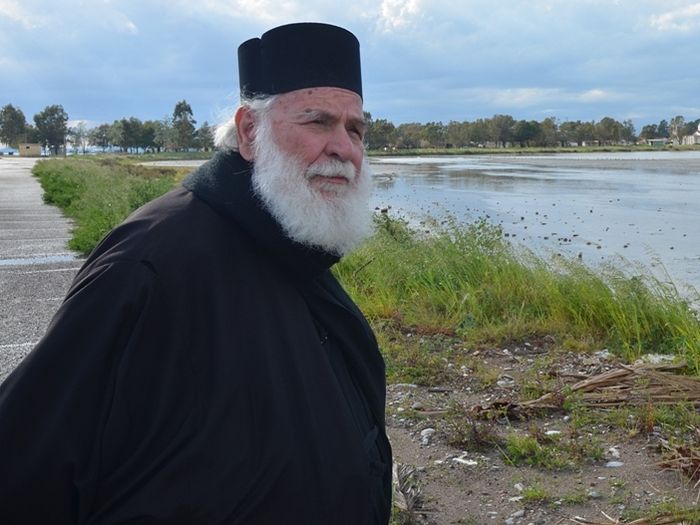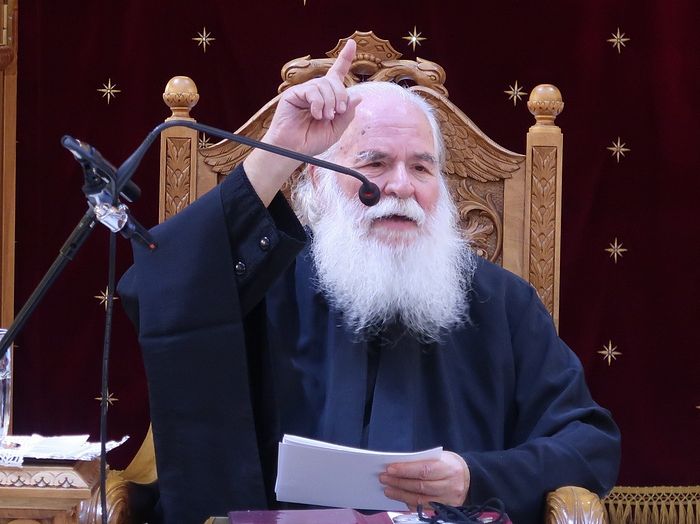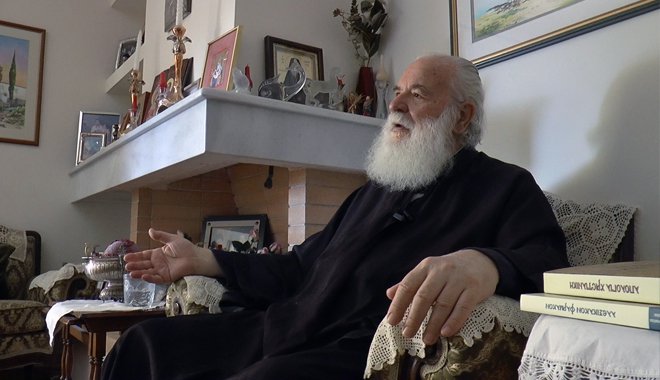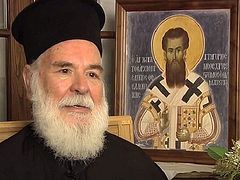On December 19, 2019, the theologian, historian, and pastor, Protopresbyter George Metallinos departed to the Lord. “Warrior of Christ”, “lion of Orthodoxy”, “universal teacher”, “general of the Church militant”—such are just a few of the epithets that Fr. George’s contemporaries have used to describe him and his outstanding contributions.
The scholar and Pravoslavie.ru author Athanasius Zootakis has provided this brief biography of Fr. George and selections from his writings. Over forty works by Fr. George have been published in Greek, with only one translated into English: I Confess One Baptism (ISBN 978-960-85542-0-7, St. Pauls Monastery, Holy Mountain, Greece, 1994). After reading these citations provided by Athanasius Zootakis, one can only hope that more of Fr. George’s works be translated into English—they are so accessible, clear, strong, and true. And they so poignantly speak to the problems of our age.
 Protopresbyter George Metallinos
Protopresbyter George Metallinos
The holy fathers of our Church placed a dividing line between “external” and “internal” knowledge. External (scholarly) knowledge is occupied with studying the God-created world, while “internal” knowledge, “theology”, calls to a knowledge by experience of the paths of spiritual growth. Fr. George Metallinos was able to encompass both types of knowledge—his scholarly activity was organically combined with his life of prayer and ascesis.
This is how Fr. George described this combination:
“A scholar who has learned mental prayer solves scholarly problems with the help of reason, while the mind that is contained in the heart preserves the unchanging remembrance of God.”
Another distinguished Orthodox scholar and pastor of the twentieth century, St. Justin (Popovic), also answered the question of what it means to be an Orthodox theologian:
“To be an Orthodox theologian means to explain Holy Scripture through the holy fathers, and along with that, to emulate their lives.”
Fr. George himself, on all the paths of his life, was also guided by the principle of “committing all our lives unto Christ our God.”
“The Church does not tear man into soul and body so that the spiritual is differentiated from the material… The whole man must be saved, delivered from sin and death, and be freed and deified.1 And this happens with the “Christization” of our whole lives—spiritual and bodily, personal and societal. The point of view that man can spiritually (as applied to the soul) be nourished by Christ and at the same time be bodily and socially poisoned by the “godlessness” of this world’s political and social systems is absolutely not Orthodox.”
All who knew Fr. George (including the author of this article) testify that he was a true laborer in asceticism. He combined his academic knowledge in all humanitarian spheres and his enormous scholarly horizons with such qualities as courage, humility, sincerity, politeness, guilelessness, and sympathy. He had a mature mind and a childlike heart.
Brief biography of Protopresbyter George Metallinos
George Metallinos was born on the island of Kerkira (Corfu) in 1940. As soon as he learned to read, he quickly became interested in serious literature. The first book that came into the boy’s hands was the “Treasury” of Damascene the Studite. The family did not have the money to buy books, and any publication that they were able to acquire was like a breath of fresh air.
“The Lord vouchsafed me from an early age to live amidst people who preserved their faithfulness to patristic tradition,” Fr. George would say later. His first spiritual guide was a true ascetic—Elder Ioannis Vradis.
In 1946, the Metallinoses moved from the village to the city of Kerkira. Now George had the opportunity to go regularly to church; after all, services in the village were by no means celebrated every week. When the boy had a vacation he would walk to the church in order to arrive by 6:00 am, when the services began.
Because the Metallinos family had no alarm clock, George would often arrive early at the church, since he was afraid to be late. One day, on the Theophany, he got up at five in the morning and waited outside the church until 6:30, when the altar attendant came and opened the doors.
With his characteristic humility, Fr. George never ascribed to himself any “zeal for God”:
“It was God’s grace. A little boy cannot have such resolve independently. I glorify God, Who breathed this zeal, this love into me.”
After graduating from high school in 1958, George Metallinos entered the University of Athens, where he studied in the theological and philological departments. After service in the army he became a scholar in the department of patrology in the theology department of Athens University. From 1969 to 1975, he studied in the masters program in Bonne and Koln (Germany), and did research in the British archives. Study overseas both strengthened his faith and broadened his horizons. Having studied Western Christianity from the inside, Metallinos wrote a fundamental research paper on the papal primacy, the Unia, and the ecumenical movement. He produced well-argumented criticism of heterodox influence on the life of the Orthodox Church.
In 1971, George was ordained a priest, and defended his doctoral dissertations—one in theology in the University of Athens, and the other in the history of philosophy in Koln. Fr. George taught the historical and theological disciplines for many years, received a number of scholarly titles and awards, and was dean of the University of Athens theological department.
His sphere of scholarly interests was enormous: Liturgics, social sciences, history, study of primary sources, apologetics, hymnography, canon law (in part, producing a monograph on the problems of autocephaly), homiletics, education, religious studies (including works on neo-paganism), and musicology. Fr. George’s research was always based upon many years of painstaking labor in archives.
Fr. George was a distinguished orator. When he appeared on television and spoke on the radio, he systematically and with sound arguments defended the Church’s position. Fr. George always received a blessing for every program, and prayed before going on the air.
Father never forgot his pastoral vocation; he served the Liturgy, preached, and heard confessions. Over the course of many years he spiritually cared for the churches in the hospitals of Athens, encountering human suffering on a daily basis, consoling, counseling, and helping however he could.
In 2019, Fr. George signed the petition of the clergy and laity of the Greek Orthodox Church against the recognition of the Ukrainian schismatics. Despite the pressure, he stood on his principles in this matter as well, unable to turn a blind eye to the injustice taking place. Fr. George many times publicly expressed his disagreement with the autocephaly granted to the Ukraine, considering that country to be in the canonical territory of the Russian Church. He was just as principled in his stand against the “Cretan pseudo-council”, and against ecumenism.
Even in the 1980s, George Metallinos had begun to express criticism of Greece’s prospective participation in the European Union. While the majority of his compatriots were euphoric over the prospects of material prosperity, Fr. George with his characteristic clairvoyance described what would be the results of European integration.
Selected quotes from Protopresbyter George Metallinos
 Protopresbyter George Metallinos.
Protopresbyter George Metallinos.
Greece’s Western Captivity
Greece has for many years been under the control of the West, which is trying to disguise its occupation, creating a false impression among the Greeks that they are allies of the West. At the same time, the country’s political leadership is basically fulfilling the function of vicars to foreign powers in Greece.
***
The spirit of Europeanization is inalienably bound up with defeatism before the West and provincialism.
Our national leaders (independently of their ideological stripes) not only disdain the cultural and historical heritage of their own country, they are even ashamed of it. Naturally, with this attitude they are incapable of fighting for their people and for the preservation of its national and religious identity…
The West is taking revenge, realizing its many-centuries-long dream of destroying our people.
***
We have placed all our hope in earthly prosperity, and the Lord has allowed that we become disenchanted with it and through this, wake up.
We have forgotten the God of our fathers and believed in absolute material values.
We have not simply bored a window to Europe; we have opened all the gates of our hearts and souls to the West.
***
The Orthodox understanding of the Church. Ecumenism.
The following error is everywhere widespread: By the Church we mean only the hierarchy, the bishops. This is the influence of papism, which was spread also in the Orthodox world several centuries ago. The Church is all the clergy and the people.
***
The only correct path is to turn with prayer (including the Jesus prayer) to Christ. This is the way out of the situation.
***
Time has shown that the ecumenical movement has a clear and concrete goal: To consolidate the world under a guise of “Christianity” and the creation of one flock and one pastor.
And what is this one world religion? Nothing other than a manufacture of the modern political “New age” tendency and a new world order. Its final goal is to consolidate the world under one pastor, and this pastor will by no means be our Lord Jesus Christ.
***
Ecumenism in all its manifestations and variations represents a real Babylonian captivity of the Ecumenical Patriarchate and a large part of the leadership of Local Orthodox Churches. The only thing that has been achieved on the ecumenical path is the legalization of heresies and the schisms of papism and Protestantism.
***
In speaking of Orthodoxy, I mean the Orthodoxy of our saints. It is precisely this Orthodoxy that we must be faithful to, and unite on the basis of it. But those who have fallen away from it and created their own version of Christianity (papism, Protestant denominations) have nothing in common with patristic Christianity (other than a similar name).
***
Dialogue with the heterodox is possible only a missionary, apostolic basis. The aim should be to help our Western brothers who have been torn away from the truth to once again acquire the Church that they have left.
Today we observe a completely different form of dialogue with the heterodox. How many high-ranking papists have returned to the Church? How many well-known Protestants have come back?
If we want to conduct a proper dialogue—fraternal, missionary, self-sacrificing—then we should make it our aim to try to help these people find the path from which they have strayed. We must unite them not with ourselves personally, but with the Church of our saints, with the Body of Christ.
Now, the very opposite is happening… We have left the Western Christians to their own fate; worse than that, we ourselves are forming a deceptive impression amongst them that they are also Christians and there are no serious differences or contradictions between us.
***
Each of us is within our own fortification, and together we will stand up to the common enemy. And this enemy is not a person (patriarchs, bishops, etc.), but the spirit of ecumenism, which is poisoning Orthodoxy and destroying our unity. With love, humility, and understanding we will never cease to criticize the ecumenical path, which is a constant distancing from Orthodoxy and an identification with the forces that are ruling this world.
***
The mission of the Church. Primacy.
Do you know what our problem is? To what Christ do we call, to what faith? Are we leading people to the Orthodoxy of our fathers? Or do we think that missionary work is simply a chase after numbers—to baptize as many people as possible and lock them into some jurisdiction, in order to increase our worldly power?
This is the painful problem of modern missionary work. To what are we calling people—to the Church (Christ’s spiritual hospital) or to our earthly institutions?
***
The titles “Great” and “First” in Orthodoxy are applied to those who remain true to the Orthodoxy of the Ecumenical Councils and all the saints.
For where there exists the “primacy of truth”, there is established the “primacy of honor”—canonically deserved and invincible in Orthodoxy—clergy and laity, with an Orthodox mind, with respect and without objection. On the contrary, disobedience to any “mania of primacy” is the sacred and irrefutable obligation of the Orthodox faithful.
***
Orthodox Christianity offers man the opportunity for deification, just like medicine offers him the opportunity to maintain or restore health through specific treatment and the observance of a specific regime.
***
The method of healing that the Church offers is the spiritual life, life in the Holy Spirit. Spiritual life is lived by way of ascesis and the partaking of uncreated grace poured into the Church Sacraments. Ascesis overcomes our individual nature made dead by sin, which is headed for spiritual or eternal death; that is, to eternal separation from Divine Grace. Ascesis leads us to victory over the passions, suppressing the development of sickness in its inner recesses in the human soul, and making us partakers of Christ’s death on the Cross and His Resurrection.
***
A Christian who does not labor in ascesis is like a sick man who does not follow the course of treatment that the doctor has prescribed.
***
While the world is busy with Sisyphus’s labor, fighting for the consolidation of human societies, we Christians are fighting so that like all the saints, we might be ranked in the Kingdom “prepared for us from the foundation of the world,” and be vouchsafed grace and communion with the Body of Christ. Our entire struggle is directed toward this—to the right and complete (wholly [1 Thess. 5:23]) communion in Christ.
***
The Councils
Such a foundation-laying ecclesiastical institution as a Council is often understood by the Orthodox themselves in the worldly and legal sense. A Council, primarily the Ecumenical, is unthinkable without God-bearing fathers, enlightened by the Holy Spirit. The active presence of Christ at the Council presupposes His presence in the Spirit in the hearts of those who comprise the Council. In this lies the difference between true and pseudo councils. Only when Christ lives “in us” can He act “in our midst”. The study of the Scriptures and their use by assembled people does by far not necessarily mean that that assembly has Christ.
***
From the Western, scholastic teaching that the essence and energies in God are one and the same thing proceed all the heresies and errors of Western Christianity. For example, the dogma of the Filioque, which is blasphemy against the Holy Trinity.
Yet another error bound up with this is the deprecation of the material world (since it’s not illumined by uncreated Grace), mandatory celibacy for the priesthood, the devaluation of water (expressed in the sprinkling or pouring [as opposed to immersion.—OC.] during the Sacrament of Baptism), the view of economy as the development of man and not his deification, and finally, the sacrifice on the Cross being viewed as the satisfaction of divine justice. The acceptance of the pope as Christ’s vicar on earth is an invention needed in order to fill the empty gap that has formed between God and the world. The Orthodoxy of our saints never had the need of a man as intermediary, for there is one mediator between God and men (1 Tim. 2:5), Who remains “unto the end of the world” (Matt. 28:20): Christ, the Savior of the World (Jn. 4:42). The saints are not the intermediaries between us and God; they pray for us to Christ.
Faith that God communes with the world by means of created energies leads not only to heresies, but also to worldlification. In accordance with this teaching, there are no true Sacraments. The divine Eucharist is not saving in that case; it unites man not with the uncreated God, but with His supposedly created grace—which is not eternal, because it has a beginning and an end.
***
Theology, and especially dogmatic teaching, relates to the realm of church pastoral care. This is precisely the character that the works of the holy fathers bears. They do not bear an abstract or speculative character. Defending the truth from heresy was accompanied by healing from the passions, prayer, exhortation and spiritual formation. Patristic theology is not worldly polemics but a pastoral course of healing for the diseased parts of the organism—of heretics and those in errors. The struggle against heresy is a matter of love and love for mankind, to free it from the sickness of heresy (which cannot give salvation to man, nor to the world). Therefore the active resistance against heretical error is a manifestation of love for man.
***
 Protopresbyter George Metallinos
Protopresbyter George Metallinos
What the Venetians proclaimed during the time of their great might is the same as what we are saying today: “Primo veneziani, e poi christiani” (“First Venetians, and then Christians”). As opposed to this worldlified idea of Christianity, Christ requires our whole lives from us. “Let us commend ourselves and one another, and all our lives unto Christ our God.”2
***
Unia
The Unia is a method the papists use to subject Orthodoxy to Rome. The crafty premise inserted into this method is the so-called preservation of freedom and unbroken Eastern tradition. It serves as an alibi for those who sow Western influence into the formerly Orthodox, inasmuch as this method, as their betrayal of their own traditions and their own people, is disguised as their adherence to external aspects of Orthodoxy.
***
Truth. Community.
In speaking of Orthodoxy, do not repeat Pilate’s mistake when he asked Christ, “What is truth?” It is correct to say, “Who is truth?”... Because the Truth is not an idea, theory, or system, but the All-Holy Person of the Incarnate God the Word, Jesus Christ.
***
But how is community life built according to our authentic Orthodox tradition? A community is in principle formed with only one goal: for the sake of the deification of its members. This goal remains eternally immutable and unchanging. If this aim changes, then there occurs a false substitution, and the community slips down to the level of a worldly assembly (a club, a union, a corporation, etc.).
***
A community should become a “sanctity workshop” and “spiritual hospital”.
A person is included into the Body of Christ (and it follows, into the life of a community) in order to be healed, to overcome the disease of the fall into sin...
Inclusion into spiritual life (in this order: purification—enlightenment—deification) is a principle and immutable prerequisite for a correct entrance into the life of the Church-community, and likewise for a person’s capability for correct communion. Social virtues can in no way be the personal achievement of man’s will—only the fruits of the Holy Spirit. Where there is no Holy Spirit, His fruits will not be seen.
***
Tradition.
Tradition is not a synonym for conservatism, but to the contrary, it is the dynamic development of a way of life that embodies the ideals inherited from our ancestors, and finding new forms of expression for them that resonate with the spirit and means of a given historical period. Traditionalism is a theological function, which distinguishes our Orthodox saints first of all.
***
Europe, torn away from patristic tradition, has created a cultural paradigm that has lost the authentic feeling of God, man, and society. It has achieved dazzling progress in in scientific spheres, but has demonstrated a total inability to form people who are capable of using these scientific achievements for the salvation of mankind, and not for its catastrophic exploitation. The two world wars that gave birth to Europe and its culture show us where godlessness can lead—which has robotized the European (Western) man.
***
The ascetic tradition of our saints (ancient and modern) is the source of our culture.
***
Monasticism.
Monasticism proceeds not from the renunciation of life or the world, but from the rejection of sin and confirmation of true life—Christlife.
Monasticism is the quintessence of Christianity, its most complete and systematic self-expression.
***
In today’s world, the life of Orthodoxy is being supported by the saints. They continue to treat our illnesses—by their words (patristic and divine service texts), relics, and miracles.
***
More on the Church.
Without spiritual premises, Orthodox mission cannot exist. Its foundation is not morals or ethics, but ascesis and the Holy Spirit.
***
The prophets—apostles—holy fathers move in one direction, along the lines of Church tradition. They are the bright lighthouses and guideposts on the path of its development.
***
The churchly way of life places man on the path of ascent to heaven. Joy, the joy of Christ, expressed in brotherhood and “community” (Acts 2:42)—this is the final goal of this world.
***
Western theology looks at God as at a solar disc that shines in the sky, but without the rays to reach the earth in order to warm and enliven the world. In that case, whether there is the sun or there isn’t has no practical significance. As a counterweight to this, God in Orthodoxy is a God Whose rays warm the earth and enliven it. Therefore people hurry to break out of the cellars of sin and destruction to the surface, in order to feel the saving energy of the Sun of Righteousness and obtain salvation.




